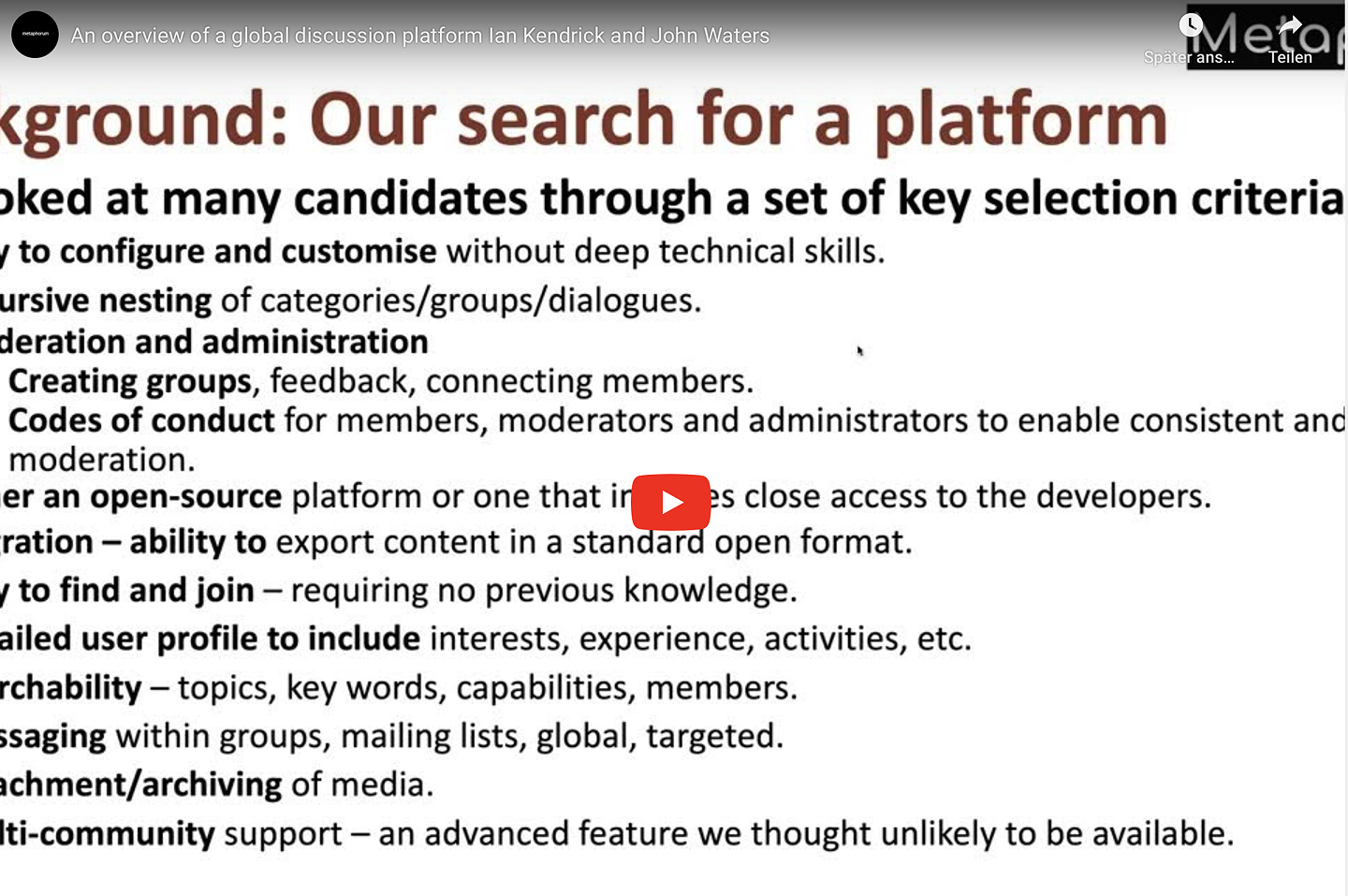
This webinar will explore several aspects of the large-scale communications platform outlined briefly at the 2023 Metaphorum Conference, including the vision that led to its creation, the problems already identified over a number of years that motivated its creation, and numerous factors that had to be considered before any work could begin.
The need for such a platform has been evident to a number of people for a very long time, but this is really something that has become fully clear only recently. These conclusions have been reached in very different ways, along very different paths, and with very different assumptions about what might or might not be practicable. Indeed, such a project will probably have seemed overwhelmingly daunting to most. Almost by chance (although that does favour the prepared mind), a spark of synergy led quite recently to a possible realisation of what had previously felt only like a distant potentiality.
The following needs have been particularly important in bringing this vision into clearer focus:
- The need to support connections between ethos-cohered communities as self-organising, co-evolving structures.
- The need to support and enhance the viability of autonomous organisations within appropriate recursive structures.
- The need to enhance the capability of any viable organisation to apply the VSM in support of its own viability.
As a starting point, a small number of autonomous recursive structures have been created, each for use by a different organisation, on its own terms, acting according to its own rules. The only thing shared by these organisations at this stage is a significant commonality of ethos.
The one organisation on which we focus here is Metaphorum. This is partly because the initiative was sparked within Metaphorum dialogue. It is mainly because Metaphorum is a community exceptionally rich in highly relevant and valued skills that will be needed both to shape this embryo and to nurture its development following its birth.
Following a brief glance at the overall structure, we shall demonstrate the platform in greater detail by focussing upon Metaphorum’s community and, in particular, the support the platform provides to SIGs (Special Interest Groups) within Metaphorum itself.
Speaker Bio
John Waters
After studying engineering at university, John spent a few years designing and developing communications equipment, data loggers and other instrumentation. Since life in a laboratory can only sustain one for so long, he abandoned this relative security for an enlightening series of adventures within and among various co-operative enterprises and eventually found a stimulating niche in the diverse world of community economics, collaborating on feasibility studies, exploring alternatives to the status quo, and spending decades contemplating different approaches to the matching of resources to needs in way more compatible with the viability of both people and the planet. Along this rocky path, he was sustained by a combination of eudemony and serendipity, nourished by autodidactic explorations and the application of diverse systems concepts.He is currently exploring (with colleagues) ideas around contributive economics and support for ethos-cohered communities. When pressed for a label, he generally prefers humble newt farmer.
Ian Kendrick
Ian specialises in facilitating teams to develop, communicate and deliver strategic innovation – from inception to growth – in turbulent environments. Working with NGOs and commercial organisations, he engages with ethos cohered communities looking to achieve systemic transformation in their environment and in themselves. This work brings the ability to re-perceive situations afresh to enable transformation and continuous adaptation.
Ian uses approaches that are cybernetic and systemic, engage with complexity and bring different perspectives to bear on the matter in hand. These approaches include the VSM, Syntegration, futures thinking including Three Horizons, discontinuous, disruptive and transformative innovation, decision making and narrative creation.
He led a major research project exploring the emergence and agency of online communities and their potential to address the needed variety to address major societal issues and essential change in our world. This work forms the foundation for much of Ian’s work with many online communities, helping them to form, connect, cohere and amplify their work together.
Ian has held senior positions in small and large organisations and facilitated many through difficult periods of transition as CEO. He has worked in cross cultural appreciation and local communities. Ian is a fellow of the Royal Society for the Arts, co-founder of H3Uni and a Samaritan in the UK.
